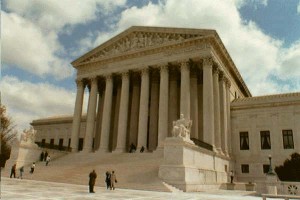Finding a New Canon of Statutory Interpretation in an Old Case
Yesterday, Professor Anita Krishnakumar gave an intriguing presentation on her latest paper entitled “The Hidden Legacy of Holy Trinity Church: The National Narrative Canon.” A copy of her paper can be found here. In her paper, Professor Krishnakumar explores the controversial, but not often discussed, portion of the famous Holy Trinity Church decision. The well-known, and still somewhat controversial, portion of the decision finds the Court relying on the “spirit” of the statute instead of its plain language — with support from legislative history. The more controversial section of the opinion argues that even setting aside traditional methods of statutory interpretation, the statute — which was essentially an anti-immigrant labor statute — could not be enforced against the employer church because the United States of America “is a Christian nation.” Professor Krishnakumar argues that this methodology constitutes an interpretive canon for statutory interpretation: the national narrative canon. She also points to other Supreme Court opinions that use a similar methodology where the Court not only uses traditional interpretive canons, but also this national narrative canon — relying on history and public norms — in deciding the cases.
Professor Krishnakumar warns that this newly-identified, but long extant, national narrative canon poses a threat to the perceived legitimacy of courts’ statutory interpretation because it often runs contrary to the text of the statute, produces bad policy, and can create an unfair exception for a particular entity. While the national narrative canon has been used selectively, it will be interesting to see if the Supreme Court — and indeed other courts — moves more towards this public norms approach to statutory interpretation. In this age of New Textualism, it strikes me as likely that — as seen with the cases Professor Krishnakumar analyzes — to the degree its used, the Court will couple the national narrative canon with another more traditional approach to statutory interpretation in reaching its decision. In this regard, the Court will continue to make the national narrative canon less effective in terms of precedential value, seemingly serving more as dicta. However, its potential effect should not be understated, as these portions of the Court’s opinion can still have powerful effects in the political realm in ways which may run contrary to our society’s commitment to pluralism and diversity.

